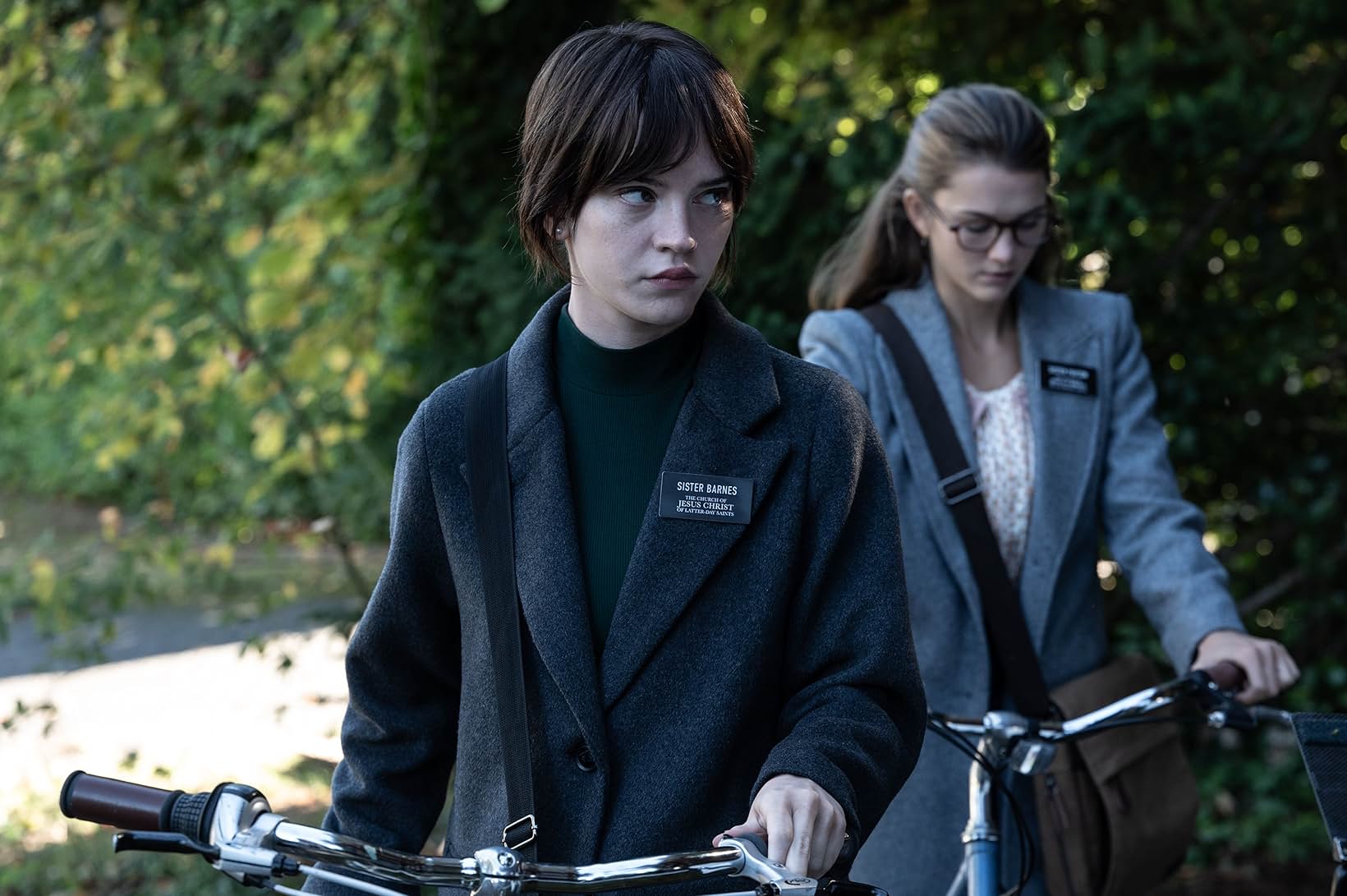Movie review: Religious thriller ‘Heretic’ chills viewers with eerie setting, mounting tension
Mr. Reed (Hugh Grant) glares at the two Mormon missionaries Sister Barnes (Sophie Thatcher) and Sister Paxton (Chloe East) under eerie lights. A24’s latest thriller “Heretic” released in theaters everywhere Friday. (Courtesy of IMDb)
“Heretic”
Directed by Scott Beck and Bryan Woods
A24
Nov. 8





By Martin Sevcik
Nov. 8, 2024 4:03 p.m.
“Heretic” is an ascetic, tense thriller that places full faith in its acting talent.
Filmmaking duo Bryan Woods and Scott Beck’s latest cerebral thriller enlightened audiences in theaters Friday, following Mormon missionaries Sister Barnes (Sophie Thatcher) and Sister Paxton (Chloe East) on their visit to a secluded home for a proselytizing mission. Mr. Reed (Hugh Grant) invites them in, entrapping them in his maze-like home as he tests their faith through a series of tough decisions and challenging conversations, promising to show them “the one true religion.” While the religious thriller is blessed with contemplative acting and divine pacing, it fails to deliver a truly revelatory experience.
[Related: Movie review: ‘Venom: The Last Dance’ delivers a touching finale, blending action with nostalgia]
Despite some gruesome imagery and an occasional adrenaline-pumping moment, this is a cold-blooded thriller through and through. Mr. Reed is a creepy man, not a slasher monster, instilling tension over terror as the audience and sisters navigate his perverse schemes and motivations. He does not chase them as they sneak around the house, but instead stands face-to-face with them as they find themselves trapped in room after room with little hope to escape.
And all he wants to do is to talk. He reassures the sisters that they can leave any time, that he just wants to ask a few questions about their faith. He lectures at them for minutes at a time, trying to tear down their piety and replace it with – well, it’s unclear. The audience intimately understands that he is capable of horrifying acts – the filmmakers play into the obvious underlying discomfort from an older man entrapping two young women. With the stakes set, the tension lies in unpacking his motivations and ultimate goal for these two women as he lectures them throughout the night and shepherds them through his toybox of a home.
Those conversations are the thematic heart of the film, offering Mr. Reed and the sisters face time to deliberate the tenets of the Mormon faith and the fundamental nature of religion. In their first interaction, he asks uncomfortable questions about polygamy and Sister Barnes’ dead father. By the end of the film, he is offering ideas that would fundamentally alter their entire worlds. He makes his intentions to proselytize the sisters clear, and the audience gets a front row seat to his peculiar efforts.
In a film so centered on its blasphemous villain, Grant more than pulls his weight. At times, the script demands that Mr. Reed come across as a ho-hum husband, a passionate scholar of religion, a psychotic conspiracy theorist or a Jigsaw-like mastermind. Grant excels in every aspect of the role, reveling in minutes long monologues and elegantly escalating his character’s instability and egoism as the stakes heighten. He is always the center of the film, demanding fear without even so much as an overt threat.

When Grant is not the center, Thatcher and East are compelling, cerebral leads. They are interlocutors first and foremost, constantly forced to choose between playing Mr. Reed’s games or defying his arguments: That Jesus is but one of many historic prophets, that Mr. Reed can show them miracles or that belief in God is as terrifying as disbelief. They play off of each other extremely well, undergoing a compelling transformation from polite missionaries to determined scream queens as their situation worsens. There are no cracks in the acting here.
Perhaps to make up for this, the plot and scriptwriting falter instead. While Grant’s acting is compelling, Mr. Reed’s monologues do not quite stick for anyone with even a passing familiarity with religion or religious studies, poking well-trodden holes in the world’s major sects. He speaks like a mediocre YouTube video essayist, using deeply unnecessary metaphors about the board game Monopoly or bringing up philosophical theories just to sound smart. And the film makes a point of explaining to the audience that his words are hogwash, implying he is meant to be taken seriously – yet the point is a little too self-evident to be impactful.
And where the film begins as a grounded thriller, it develops a series of contrivances as the ending approaches, which shatter the illusion of immersion. As more of his home is revealed, the sheer magnitude of Mr. Reed’s game makes the premise untenable. He is at his most unsettling when he is fathomable in our real world, which is all but abandoned as the film builds up to a horrifying but fundamentally unbelievable conclusion. The audience falls into disbelief, and the film’s hard-earned tension disappears along with the stakes.
[Related: Film review: ‘Smile 2,’ despite its toothy gore, is little more than an empty smile]
This is a shame, given the strength of character and production on display. The film’s pared-back score and delightful set design perfectly set the scene, and the cinematography and editing build and release captivating tension. Sister Paxton’s character development after the film’s best twist – carried by East’s delightfully effortless performance – and Mr. Reed’s fabulous characterization is deeply satisfying on the screen. And the film is immensely watchable, with well-paced action making it feel much shorter than its hour-and-50-minute runtime.
“Heretic” fails to preach its religious thriller premise, but this is still a sermon worth watching.
